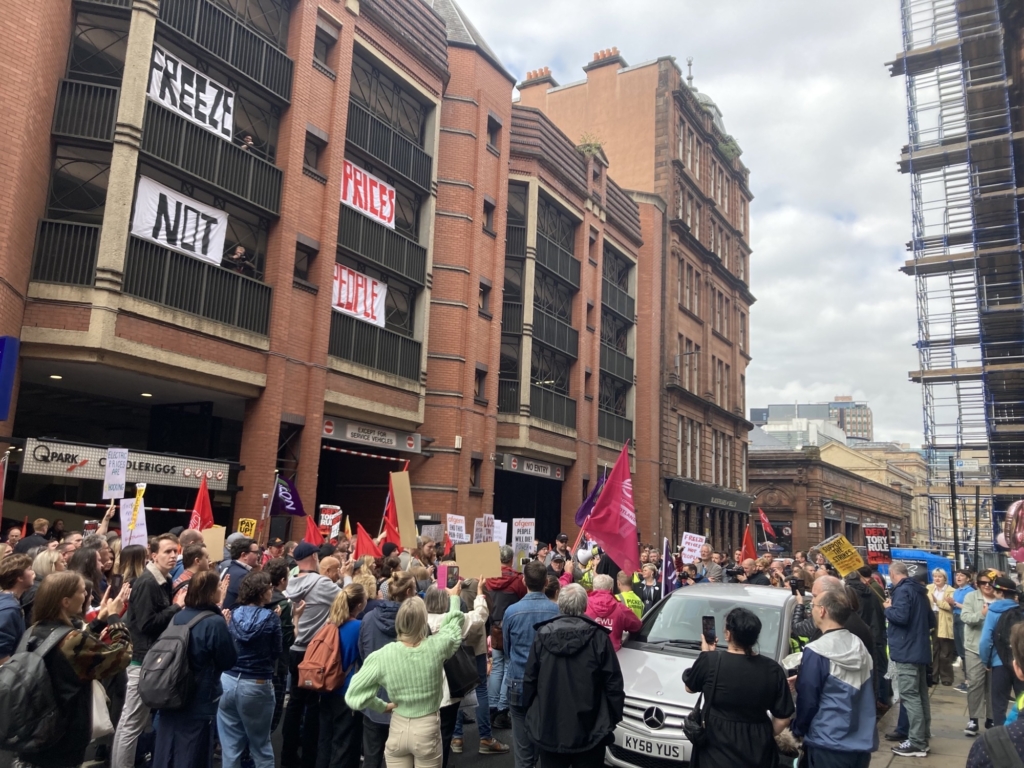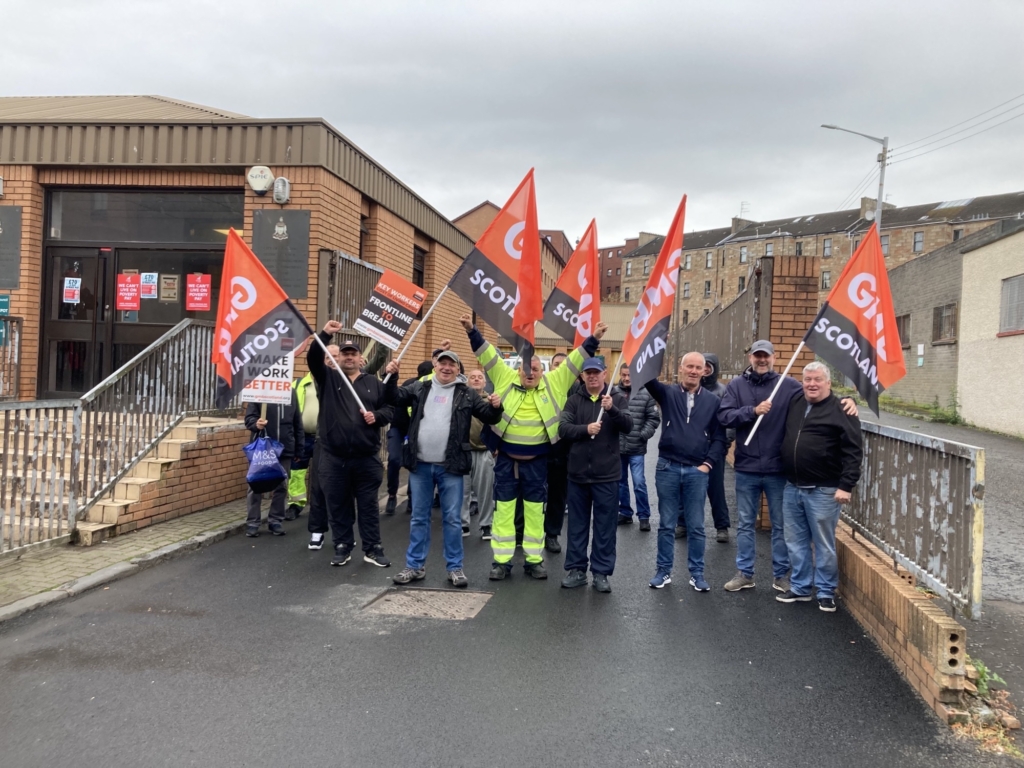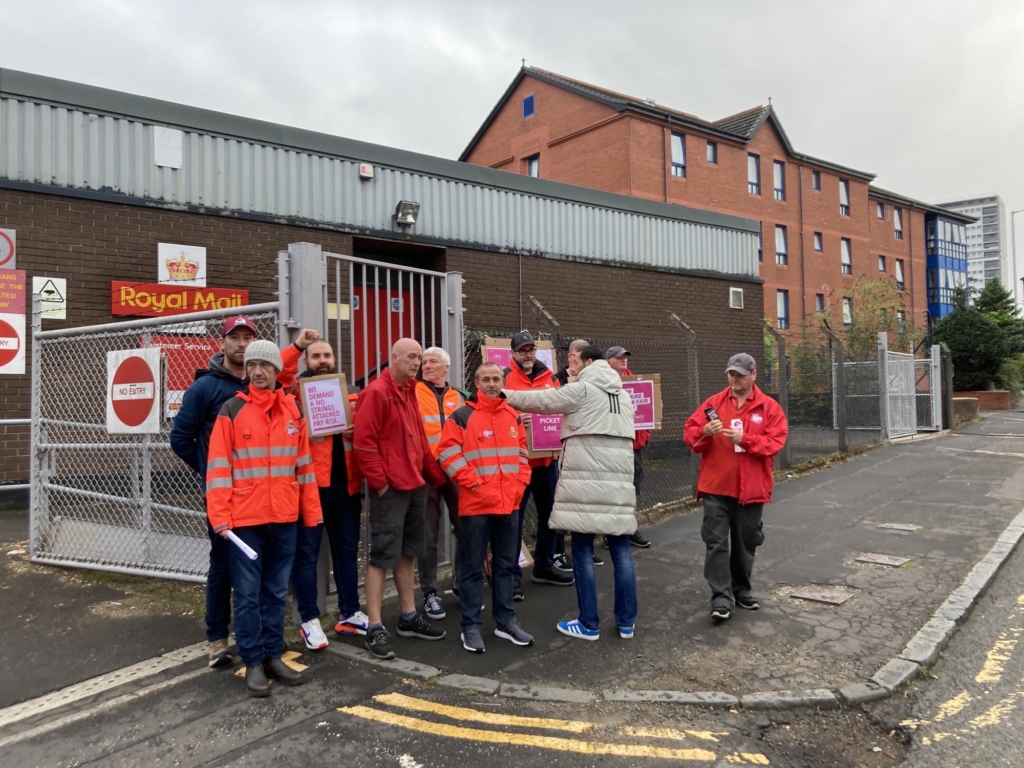Strikes, Protests, and Solidarity
‘‘We’re not going to have it anymore! The exploitation of working people stops now!’’
From Glasgow’s Buchannan Street steps, Roz Foyer’s powerful words were met with rapturous applause. The sounds of whistles, cheers, and wailing megaphone sirens cut through the rain as hundreds of striking workers, trade unionists, tenants’ unionists, and other activists stood shoulder to shoulder in solidarity against the self-serving, political and economic ruling class. Foyer, the Scottish Trades Union Council (STUC) General Secretary, was one of several inspiring speakers at the Glasgow Strike Rally of Friday August 26th. Their message was clear: enough is enough.
With public sector workers from postal to cleansing services striking across the city, the trade union movement rallying on Buchannan Street in demand of fair pay, and ‘Power to the People’ campaign activists protesting increased energy price caps outside Ofgem’s Glasgow offices, you couldn’t turn a corner on Friday without stumbling across a site of resistance. I spent the day between many of these picket lines and protests. Striking workers, organisers, and campaigners spoke to me about the nature of their industrial disputes, the challenges facing working-class movements, and the strong networks of solidarity being built up across Glasgow, Scotland, and the UK.
Council workers in schools and cleansing services throughout Scotland are engaged in a pay dispute with The Scottish Convention of Local Authorities (COSLA). On Friday, cleansing and waste workers represented by GMB and Unison trade unions across 20 local authority areas joined Unite members in 14 local authority areas in taking industrial action against COSLA’s latest pay offer. Having firmly rejected the 2% rise initially tabled, negotiations are now ongoing over the terms of COSLA’s new offer of 5%. Trade unions are demanding that this comes as a flat rate increase, which would mean the lowest paid workers see the biggest cash increases proportionately. With inflation forecasted to hit 18% by early 2023, rent soaring by up to 25% over the past year, and the latest Ofgem price cap announcement estimated to see 36% of Scottish homes plunged into fuel poverty, this is a modest demand.

On the picket line outside Glasgow’s Western cleansing depot, I spoke with striking workers including Graeme Drew, a supervisor within the Glasgow City Council cleansing department. Graeme is a Unite trade union member and picket supervisor. He said: ‘‘I’m like most people. I’m a family-oriented man. I am from deprived areas, I’m from Springburn. I started in Glasgow City Council when I was 17 as an apprentice and I’ve worked my way up. I don’t come to work for convenience. Like most people, I come to earn a living. I come to do the best job I can possibly do with the resources that are available to me. I’ve got 2 kids below the age of 5, so I’m really concerned about what we’re going to be handing them, and my kids’ children. You know, it’s very emotive, when you think about it like that. It’s not a very good outlook unless we change things, and things need to change, because it can’t continue like this. It just can’t. Because the amount of people who are going to be put into destitution just doesn’t bear thinking about. It’ll be disastrous.’’
On the reasons for the strike, Graeme said: ‘‘I’m out here [on strike] today because something has to give. Enough is enough. There needs to be a complete realignment here of what happens in society, because it doesn’t matter where you look, every section of society is in crisis. Every single section. And, in my opinion, its not by accident. This is by design. We’re not in the midst of a crisis here, we’re in the middle of a robbery. That’s what is happening. And the destitution that people are going to face in the coming months is disgraceful in a country with the resources and the wealth we’ve got.’’
He continued: ‘‘I believe there is plenty money about, but I fundamentally believe that money is in the wrong hands. And I don’t think that anything is going to change soon, because the people we elect clearly don’t represent us – that’s evident.’’ Speaking about politicians’ failures to represent the people who elect them, Graeme said politicians were fundamentally at fault: ‘‘They’ve allowed this to happen. They’ve sat back and systematically allowed this to continue. And its about time the citizens of the UK realigned the contract between us and the government, because for far too long, we’ve been dancing to their tune.’’

Glasgow City Council-Western cleansing-depot picket-line GMB and Unite members.
Earlier in the day, I had joined striking Royal Mail workers (represented by the CWU trade union) on their picket line at the delivery office in Broomhill. Royal Mail was privatised in 2013. This year, amid 11.8% inflation, it imposed a meagre 2% pay increase on workers, despite recording £758m in profits and paying increased multi-million-pound dividends to its shareholders. Workers are demanding a pay rise in line with inflation and to be properly consulted over Royal Mail’s modernisation plans. Friday saw CWU Royal Mail and Post Office staff on strike the length and breadth of the UK. On the picket line in Broomhill, people driving by were blaring their car horns and raising a fist in support of the striking workers. Later, when I was speaking to Graeme outside the Western cleansing depot, I asked him about solidarity within the trade union movement generally.
He said: ‘‘I think there have been industrial disputes recently, but they’ve been more local issues. But what we are witnessing here is a national movement, and I feel that once the momentum builds, it’s very difficult to stop that momentum. And I firmly believe that the people at the top are feart that we mobilise, we get organised, and we use the power that we’ve got constructively. Because we do hold the power. The problem, I feel, is we’ve been very disorganised, and we’ve not realised how to exercise that power properly.’’
In the afternoon, following picket lines, workers from across the city came together on Buchannan Street for the Glasgow Strike Rally. Sean Baillie, an Organiser for GMB Scotland, spoke to me about the growing sense of solidarity and momentum building in the trade union movement: ‘‘Its fantastic to see. Last year, GMB members in waste were on strike and we had 8 picket lines across the city – this year we’ve got 16. So even within the city, we’ve doubled the picket lines and almost doubled the number of members and workers that are in dispute. We also have over 1200 school workers coming out [on strike] at the start of September if no fair deal is tabled. So, it’s the first in a tsunami of strike action, if you will, across the UK. Obviously with the RMT dispute, and the CWU dispute too, I think it’ll only grow and grow. Its great to see. I think workers have had enough, and there is a feeling that everybody is really resolute in the fact that the working-class won’t pay for the failures of an executive class.’’

Royal Mail picket line at delivery depot in Broomhill, CWU trade union
I asked Sean about the impact of the so called ‘cost-of-living crisis’ on working people so far. He said that having been called key and essential workers by the Scottish government throughout the pandemic: ‘‘Our slogan for this dispute is ‘from the front line to the bread line’…They [workers] were always close to the breadline, and with increases to housing costs, energy costs, food – everything has gone up – it has pushed the majority of our membership onto the breadline. There is no escaping that fact. A lot of people were relying on overtime just to have a wee bit of extra cash, and that’s been swallowed up now. People can’t afford to get to work, they can’t afford to eat at work, and we’re going into the depths of winter and a lot of people are not going to be able to heat their homes.’’
Another person I spoke with at the Glasgow Strike Rally was Ruth Gilbert, a Glasgow member of Living Rent Tenants’ Union. Ruth told of a similarly bleak situation for tenants: ‘‘On top of the increase in food and fuel, tenants are being hit with waves of unaffordable rent increases. Just last week a Glasgow Living Rent member, Jemma, was hit with a £200 per month rent hike and the threat of a winter eviction (you can read more about Jemma’s story on Glasgow Live). These hikes are entirely legal. The Scottish Government are keen to shift the blame to Westminster wherever possible, but we all know that housing is devolved. It is within the Scottish government’s power to cap rents now. Tenants are paying out often half their take-home wage on unregulated ‘market’ rents, yet a rent freeze is one level they [the Scottish government] are refusing to use to combat poverty. Tenants don’t have time to wait – we need emergency measures now.’’
On the solidarity being displayed across the day’s pickets and protests, Ruth said: ‘‘The cross-union solidarity in Glasgow has been solidifying over time – so when a massive day of action like today’s takes place the networks are already there to mobilise across our communities. It was bolstering to hear the GMB cleansing workers shout out Living Rent members this morning at Polmadie [cleansing depot]. The Clenny stood with tenants during our campaign for greater investment in council services and tenants will remain shoulder to shoulder with them in their fight until they win the conditions they deserve.’’
This material solidarity was evident across the day’s events. So too was the sense of a unified struggle against the far-reaching implications of neoliberalism and capitalism. At 4pm, hundreds of protestors gathered outside Ofgem’s offices in Glasgow City Centre, protesting against rising energy bills on the same day that Ofgem raised the energy price cap by 80%. The event was organised by the ‘Power to the People’ (PTTP) campaign, who have committees set up in Glasgow, Dundee, and Liverpool so far. The campaign, launched in July, has 3 clear demands: a freeze in energy prices, an end to prepayment meters, and an end to debt payment fees. Ross Gibson, a trade union member, social worker, and member of the PTTP Glasgow organising committee, told me: ‘‘Power to the People are aware that this isn’t just about gas and electricity. This is part of the myriad of catastrophes that are being inflicted upon us, by neoliberal governments that don’t give a fuck about the people that live in their country.’’
Ross spoke about his work as a social worker and the devastating impact of poverty on communities. He mentioned the ‘‘correlation between exposure to poverty and deprivation and subsequent adversities like neglect and abuse…I know the pressures parents will be put under when they’ve got a choice between heating their home, paying their council tax, paying for their car, feeding their kid, clothing their kid, and there is only so much [money] that can go around.’’
On the impact of the so-called ‘cost-of-living crisis’, he said: ‘‘We know that gas and electricity prices are going to mean that elderly people are going to choose between heating or eating, and to have to do without one of them is a really bad thing for somebody in a precarious, vulnerable, and unhealthy situation. In reality it means that over this winter there are going to be people dying of hypothermia in their own home. There are loads of folk that are going to become pray to loan sharks, and there is going to be an increase in [poor] mental health.
Poverty is the fuel to the fire for all these adversities. It just exacerbates the effect of them, and amplifies the negative consequences down the line, in the short, medium, and long-term. This isn’t just a problem for 2022, this is an issue that’s going to cause problems for the next 5, 10 years, if we don’t sort it now.’’
As has been argued elsewhere, sorting out (getting rid of) such a deeply exploitative system will be no mean feat. As was the case during the pandemic, the British state will likely intervene at some point in order to prevent the total collapse of an economic system it does so well out of. The ruling class will attempt to quelle the threat of organised resistance by appeasing workers and communities with measures that offer some reprieve to the destitution, yet in no way redistribute power or wealth in any meaningful way. The trade union movement must be wary of this and continue to unify behind common cause and struggle. There must be consistent political action which challenges the domestic and indeed global economic order. But events in Glasgow on Friday give us reason for hope. When I asked Ross Gibson of PTTP what he thought of the solidarity being displayed, he told me: ‘‘It’s the most exciting time in trade unionism that I can remember, and I’ve been a trade union member for 15 years or more. And it’s not just about the trade unions, it’s about Living Rent, for example, uniting the community. It’s about political splinter groups. Its members of the public. Its everybody. Because this is something that cuts right across class divides, sectarian (political and religious) divides – it cuts across everything. It’s a tax on living. Its not a cost of living, it’s a tax on being able to keep your house warm, and everybody has to do that. Everybody has to cook their food, everybody has to get to work, in some way or another. This is a tax on being alive.’’
It is vital that we fight it together.

Really great and encouraging piece. Glad Bella is here to provide a platform for reportage like this.
Keep going.
You are right..money is in the wrong hands…civil disobedience the only answer.
In an ideal world, with a UK Government that had any interest in the people as a whole, the UK would “take back control” of the tax havens (eg Crown Dependencies etc) and impose a one-off 20% Wealth Tax on all the funds sitting there.
The total assets of these tax havens runs into tens of trillions, and largely consists of money that was never adequately taxed in the first place.
In an ideal world of course, but with someone like Keir Starmer in charge of the Labour Party it just isn’t going to happen.
In any case, it would have to be implemented overnight, with no advance warning to minimise the opportunities for the super rich to move their loot elsewhere.